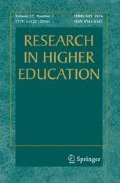Abstract
Patterns of doctoral study and subsequent career progress were compared for 756 men and women doctoral graduates in education at a research university from two six-year periods, one before and one after a rapid nation-wide increase in the percentage of women doctorates. Despite advantages relative to men in admission, financial support and full-time study, women doctorates of both periods had achieved less career progress than men but held similarly positive perceptions concerning career impact of the degree. Work experience prior to doctoral study strongly predicted career progress for both genders. Thus, affirmative action may have positively affected the careers of recent women doctorates who were younger and who began study with less established careers than women doctorates prior to 1970.
Similar content being viewed by others
References
Ahren, N. C. and Scott, E. L. (1981).Career Outcomes in a Matched Sample of Men and Women Ph.D.s: An Analytical Report. Washington, D.C.: National Academy of Sciences, National Research Council.
Berg, H. M. and Ferber, M. A. (1983). Men and women graduate students: Who succeeds and why?Journal of Higher Education 54(6): 629–648.
Biklen, S. K., and Brannigan, M. B. (1980).Women and Educational Leadership. Lexington, Mass.: D.C. Heath.
Broschart, K. R. (1978). Family status and professional achievement: A study of women doctorates.Journal of Marriage and the Family 40(1): 71–76.
Centra, J. A. (1975). Women with doctorates.Change 7(1): 49, 61.
Denmark, F. L. (1978). Women in psychology in the United States.Resources in Education, ED 171 166.
Ekstrom, R. B. (1979). Women faculty: development, promotion and pay.ETS Findings 5: 2 (Princeton, N.J.: Educational Testing Service).
Ferber, M. A., and Kordick, B. (1978). Sex differentials in earnings of Ph.D.s.Industrial and Labor Relations Review 31(2): 227–238.
Gappa, J. M., and Uehling, B.S. (1979).Women in Academe: Steps to Greater Equality. Washington, D.C.: American Association for Higher Education. ERIC/AAHE Research Report No. 1.
Hansot, E., and Tyack, D. (1982). The golden age for school administrators?The Stanford Educator, Fall.
Hartnett, R. T. (1981). Sex differences in the environment of graduate students and faculty.Research in Higher Education 14(3): 211–228.
Holahan, C. K. (1979). Stress experienced by women doctoral students, need for support and occupational sex typing: An interactional view.Sex Roles: A Journal of Research 5(4): 425–436.
Hornig, L. (1980).Climbing the Academic Ladder: Doctoral Women Scientists in Academe. Washington, D.C.: National Academy of Sciences. National Research Council. May.
Lorang, W. G., and Terenzini, P. T. (1982). Discipline-related differences among recent doctoral degree recipients. Paper presented at the forum of the Association for Institutional Research, Denver.
Malin, J. T., Bray, J. H., Dougherty, T. W. and Skinner, W. K. (1980). Factors affecting the performance and satisfaction of adult men and women attending college.Research in Higher Education 13(2): 115–130.
Randour, M. L., Strausberg, G. L., and Lipman-Blumen, J. (1982). Women in higher education: trends in enrollment and degrees earned.Harvard Educational Review 52: 189–202.
Roemer, R. E. (1983). Changing patterns of degree selection among women: 1970–78.Research in Higher Education 18(4): 435–454.
Shann, H. (1983). Career plans of men and women in gender-dominant professions,Journal of Vocational Behavior 22: 343–346.
Solmon, L. C. (1973). Women in doctoral education: clues and puzzles regarding institutional discrimination.Research in Higher Education 1(4): 299–332.
Tidball, M. E. (1976). Of men and research: the dominant themes in American higher education include neither teaching nor women.Journal of Higher Education 47(4): 373–389.
University of Michigan, Horace H. Rackham Graduate School (1974). The higher, the fewer. Report of a committee to study the status of women in graduate education and later careers. Ann Arbor: The University of Michigan.
University of Michigan (1983). Surviving and thriving in graduate and professional school: Women at the university.Center for Continuing Education of Women Newsletter 11: 1.
Wong, H. Y. and Sanders, J. M. (1983). Gender differences in the attainment of doctorates.Sociological Perspectives 26(1): 29–50.
Author information
Authors and Affiliations
Rights and permissions
About this article
Cite this article
Stark, J.S., Lowther, M.A. & Austin, A.E. Comparative career accomplishments of two decades of women and men doctoral graduates in education. Res High Educ 22, 219–249 (1985). https://doi.org/10.1007/BF00974052
Received:
Issue Date:
DOI: https://doi.org/10.1007/BF00974052


